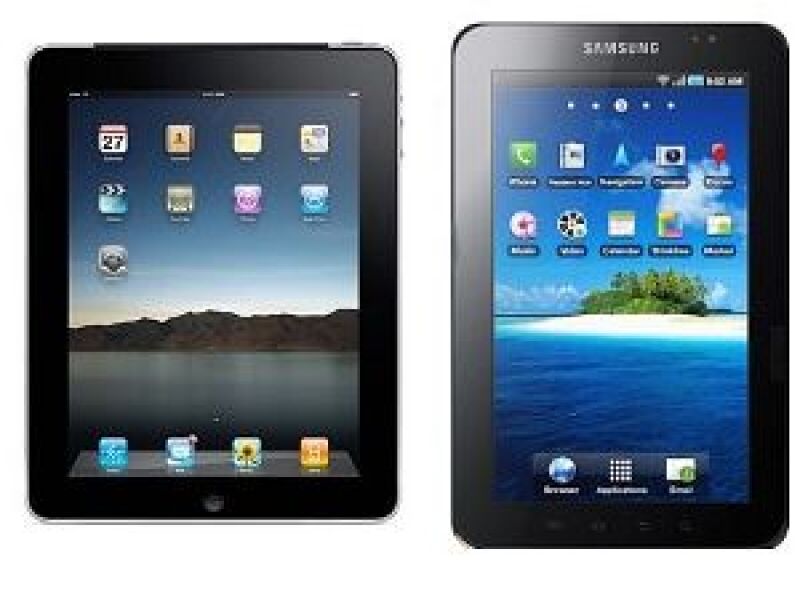No matter what happens next, the verdict was a clear message that US consumers don’t like copying. So as design teams around the world scurry back to their drawing boards, here are five trends to expect as a result of Apple’s big win.
1. Apple will act quickly to squash anti-IP sentiment
Following the verdict, groups like the Electronic Frontier Foundation dubbed Apple’s win the result of “a patent system fundamentally unmoored from its constitutional goal”. EFF said that these battles should be fought in the marketplace, not the courtroom, and that “taking Galaxy products off the market would harm consumers”.

After the backlash following SOPA and PIPA, Apple must work quickly to reinforce its image as an innovator, said Kevin Boully of Persuasion Strategies. “The best thing Apple can do now is continue to lead in innovation to squelch the perception that it’s just sitting on these patents,” he said.
Christopher Carani of McAndrews Held & Malloy added that Apple might also benefit from explaining to the public how much total sales of the infringing products were – likely in the tens of billions of dollars ‑ compared to the $1 billion jury award. “It might take a little bit of education on Apple’s part,” said Carani.
2. Apple competitors will adopt Apple’s “playbook for success”
Carani said that Apple’s “playbook for success” consists of three main features: 1) a top-tier industrial design team that created an insatiable desire to copy and emulate its products; 2) a sophisticated design patent protection programme; and 3) the desire to invest significant effort and resources in a product’s saleability.
The case will cause Apple’s competitors to reevaluate their performance in each of these areas and make improvements. “Looks matter, and that’s the reality,” said Carani.
Tim Powell of Powell Gilbert in London added that the court recognised that there is “commercial value in making everything look great, and interacting with the user” and that creating “beautiful-looking objects” will carry weight with a jury.
3. Jurors will continue to see so-called smoking gun documents as more persuasive than expert witnesses
Velvin Hogan, the jury foreman in Apple v Samsung, said in an interview following the verdict that Judge Lucy Koh is likely to find Samsung’s infringement wilful.
He said the jury was most swayed by discovery documents containing minutes of a Samsung meeting held in Korea, which included comments from Google executives expressing discomfort about the similarity of the products at issue to Apple’s.
In another document, a Samsung VP said the products weren’t close enough to Apple’s. “You need to move closer,” said the VP according to Velvin, who added: “They did move closer, but in moving closer, they crossed the line. That was unnecessary. You can compete in this country, be similar, and at the same time compete fairly.”
This is in line with statistics that say cases like this often come down to one or two incriminating emails. In fact, jury consultant Ronald Beaton of Trial Graphix told Managing IP in early August that it would play out this way.
“Even with a smart jury, cases are sold to juries like houses ‑ on memorable features that stick with you. It’s going to come down to emails and documents that clue us in to what Samsung was thinking when designing these devices,” said Beaton.
4. Litigants will focus more on what they did well, rather than attacking their opponents
While Apple was playing up its reputation as a lead innovator, Samsung might have spent too much time trying to show how Apple’s designs were lacking, and not enough time playing up its own reputation as an innovator. After all, Samsung holds even more design patents than Apple.
The jury’s verdict should inspire parties in suits like these to “create positive stories” about their own contributions to innovation and focus less on faulting their competitors, said Boully.
In fact, in a statement directly following the verdict, “a story” is exactly how Apple framed its case. “We are grateful to the jury for their service and for investing the time to listen to our story and we were thrilled to be able to finally tell it,” said a company spokesperson.
Samsung, meanwhile, focused on the lack of novelty in Apple’s designs. “It is unfortunate that patent law can be manipulated to give one company a monopoly over rectangles with rounded corners, or technology that is being improved every day by Samsung and other companies,” said the Samsung statement.
“Samsung could have talked more [during the trial] about how it got around the Apple patents,” said Boully.
5. Foreign companies’ suspicions of US courts will be reinforced (but they will still litigate if they have to)
The Apple v Samsung trial was held in San Jose, California, just up the road from Apple’s Cupertino headquarters. This has led to accusations of hometown bias, something that non-US companies often complain of – especially when they are defendants.
Powell told Managing IP this decision would do nothing to undermine that fear, especially when defendants find themselves in a district court next door to the patent owner’s factory, and facing relatively broad patents. “That’s even more the case when you have a jury rather than a judge,” he added.
But Powell stressed that the picture is more mixed at the International Trade Commission, where technical panels mean that overseas companies feel there is a more level playing field.
Despite the concerns of non-US companies, they are unlikely to duck patent litigation, especially in the smartphone industry. “Litigation in this area keeps rolling on. It is a war of attrition,” said Powell. Most companies have deep pockets and large portfolios, so even when one patent battalion goes down, they can bring in the reserves and file another round of lawsuits.
Litigators and courts are likely to be kept busy for some time yet.









